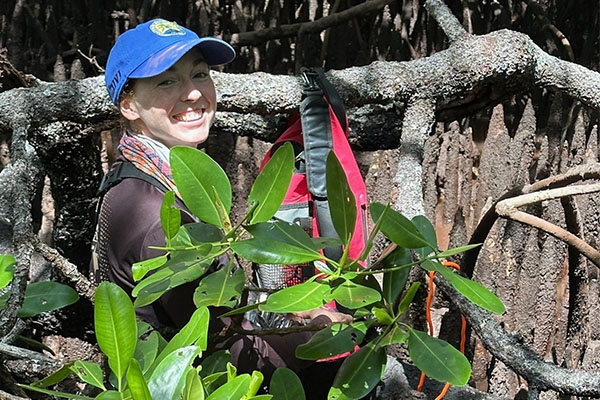
In January, an international team of researchers from the University of the Virgin Islands (UVI), University of Rhode Island, East Carolina University, University of Papua, the National Research and Innovation Agency, and the Indonesia Climate Change Trust Fund convened in West Papua to explore effective strategies for conserving and restoring mangrove and seagrass ecosystems. This meeting was a pivotal step in preparing for the establishment of a Global Center for Blue Climate Solutions.
Funded by the U.S. National Science Foundation, this two-year project aims to accelerate inclusive science and education through data collection and artificial intelligence, fostering new collaborations between the U.S. and Indonesia. The project features two researchers from UVI’s Center for Marine and Environmental Studies: Dr. Kristin Grimes, research associate professor, and Allie Durdall, program manager for UVI’s Growing Research, Restoration, Outreach and Education (GRROE) USVI Mangroves.
Emi Uchida, a professor of environmental and natural resource economics at the University of Rhode Island, led the U.S. team, which included faculty, early career researchers, and graduate students, to Southwest Papua, Indonesia. The team organized a “Knowledge Convergence Workshop” to initiate fieldwork in four coastal communities. The workshop aimed to foster research collaboration and create a shared vision for the future global center. More than 35 participants, including social and natural scientists from U.S. and Indonesian universities, local community leaders, nonprofit organizations, and regional and national government agencies, contributed to the discussions.
University of Papua colleagues played a crucial role in building trust, which facilitated the engagement of key community stakeholders in Blue Climate Solutions. One community leader remarked, “This is the first time that I sat on this side of the room, as a panelist, and those from the U.S. are on the other side, as the audience.” Uchida noted, “By the end of the three-day workshop, it was clear to all that the future Global Center should foster community-centered science that helps all stakeholders make better decisions.”
Field research followed the workshop, with scientists visiting four communities to understand local values and management practices regarding mangrove and seagrass ecosystems. Selvi Tebay, principal investigator and professor at the University of Papua, stated, “Our partnership with three universities from the United States will foster new ideas, encourage innovative thinking, and lead to more creative and effective solutions for addressing global climate issues.”
Social scientists trained local youths to gather elders’ knowledge about mangroves and seagrasses, while focus groups were organized to collect qualitative data on the significance of these ecosystems, their usage, changes over time, and community willingness to participate in future blue carbon projects. Natural scientists employed various technologies and methodologies for species identification, carbon density evaluation, and microplastics contamination assessment. Drones were used for aerial surveys, sediment cores were extracted, and sensors were deployed to measure water salinity and tides.
Dr. Kristin Grimes expressed her enthusiasm, saying, “It was incredible to be part of such a dynamic, international team who were committed to learning from one another and from the communities with which we were working. And the mangroves were incredible. There were so many different species and some forests had trees over 4 feet around and 100 feet tall.”
This international and interdisciplinary collaboration has broadened perspectives and promoted the integration of innovative tools and approaches to research, fostering a respectful and engaged cross-cultural teamwork environment.
“Working on this project, across disciplines, cultures and nations, has helped me to see how the work we do here in the USVI fits into a broader context. It has fueled new collaborations and research ideas I hope to pursue as I continue to grow the GRROE USVI Mangroves program and my career,” says GRROE USVI Mangroves program manager, Allie Durdall, a graduate of UVI’s Master of Marine and Environmental Studies Program.
Paired workshop and field experiences provided a lens through which the team can expand cultural and language immersion, real-time knowledge sharing in the field, adaptive work planning, and reflections for the future. Despite some challenges, the team noted the value of patience, a positive spirit, and the importance of laughter.
“The strong interpersonal relationships and mutual respect will be the foundation for future collaborations in the Global Center,” says Uchida. Going forward, the team hopes to share experiences, data, and lessons learned with communities, stakeholders, and academia, further expanding capacity and opportunities to establish the Global Center for Blue Climate Solutions.